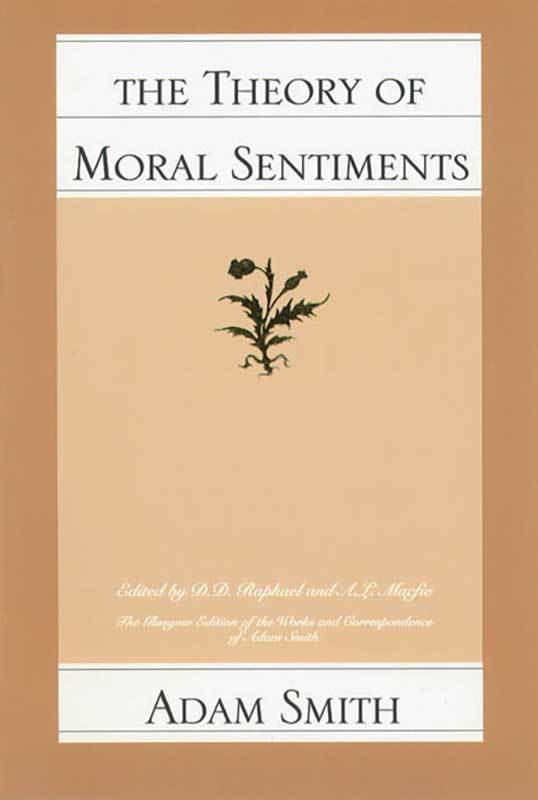
That the innocent, though they may have some connection or dependency upon the guilty (which, perhaps, they themselves cannot help), should not upon that account suffer or be punished for the guilty, is one of the plainest and most obvious rules of justice. In the most unjust war, however, it is commonly the sovereign or the rulers only who are guilty. The subjects are almost always perfectly innocent. Whenever it suits the conveniency of a public enemy, however, the goods of the peaceable citizens are seized both at land and at sea; their lands are laid waste, their houses are burnt, and they themselves, if they presume to make any resistance, are murdered or led into captivity; and all this in the most perfect conformity to what are called the laws of nations.
This is from Adam Smith, The Theory of Moral Sentiments.
One of my goals, in traveling to and from the Mont Pelerin Society meetings in Bretton Woods, New Hampshire, was to get through at least 200 pages of The Theory of Moral Sentiments. I’m reading it through for the first time, in preparation for an OLLI talk I’m giving in Monterey in December. Although I found it hard slogging at first, after a while, I found a rhythm.
That guy was sharp.

READER COMMENTS
Mactoul
Nov 6 2023 at 12:32am
Adam Smith essentially calls for outlawing war. The responsible rulers have to be captured and tried in courts of law as criminals.
It is not clear how this feat is to be accomplished and who is to rule on the guilt of leaders–a world court? Thus a world government?
Historians are still arguing over guilt of the first world war. There are many people, maybe even a significant proportion of recent immigrants to the West, who think that Hamas attack was a just response to past Israeli misdeeds.
Jon Murphy
Nov 6 2023 at 7:30am
Is he? It seems to me he is making a positive claim, not a normative one. And further, given that the quote comes in a section discussing how faction and partiality can corrupt our moral sentiments and make people think unjust actions are just, I find it highly unlikely he is calling for outlawing war.
David Henderson
Nov 6 2023 at 10:38am
I agree with Jon. I think Smith was simply pointing out the horror and injustice of war.
BS
Nov 6 2023 at 11:19am
The “bin Laden/Soleimani” solution could end up being used more frequently, especially if attempts to detain and prosecute are fruitless or drag on interminably.
MarkW
Nov 6 2023 at 5:55am
That guy was sharp.
Yes, he was, but this is a common enough idea. And of course, innocent citizens should not be intentionally punished for the misdeeds of their leaders and militaries. On the other hand, holding their own civilians as hostages cannot give aggressive leaders carte blanche to attack their enemies and then retreat into the midst of their own civilian populations and be, therefore, untouchable. This ‘no repercussions for the aggressors hiding amongst the masses’ approach would ultimately lead to more violence rather than less, no?
David Henderson
Nov 6 2023 at 10:39am
My comment on his being sharp was a comment on the overall book, not just this passage, which, I agree, is a “common enough idea.”
Mark Z
Nov 6 2023 at 12:52pm
If one follows discussions of the merits of military actions that kill large numbers of civilians (e.g. Hiroshima, Dresden), most ordinary people and even many intellectuals still can’t help but make reference to notions of collective guilt in their defense of such actions. The idea that war is not a valid means of meting out justice, but rather a Trolley Problem kind of scenario, does not seem nearly as common as it should be.
Daniel Klein
Nov 6 2023 at 2:05pm
Along the lines of the quotation that David provides, see p. 547 of Smith’s Lectures on Jurisprudence.
TGGP
Nov 6 2023 at 9:58pm
In Frank Herbert’s “Dune” the great houses normally conduct a “war of assassins” against each other, which focuses on the people at the top. I always thought that seemed more civilized.
Mactoul
Nov 6 2023 at 11:19pm
Curiously, the assassination of top leaders was held somewhat disreputable in 20c. There doesn’t seem to have been any Allied attempts to do in Hitler, for instance.
America did try with Qaddfi and Saddam. I have always thought it pity that it took a massive war to dislodge Saddam. Rather discreditable to American secret services.
Mactoul
Nov 6 2023 at 11:23pm
Jon Murphy
Nov 7 2023 at 7:56am
Adam Smith is starting from a particular point (that the innocent should not be punished for the crimes of the guilty; proximity is insufficient to determine guilt. To punish the innocent for the crimes of the guilty is an injustice) and reasoning out from there. That particular point is featured strongly in law in many Western societies and philosophies.
On the other hand, you start from the top (there is no individual when talking about a state) and reason down from there. Accepting your premise as correct for the sake of discussion, how far down does the logic go? If a person is guilty of war (and thus can justly have their stuff destroyed) simply because they happened to have the misfortune of being located within some arbitrary line, is it acceptible to punish a family member for the actions of another family member?
Comments are closed.